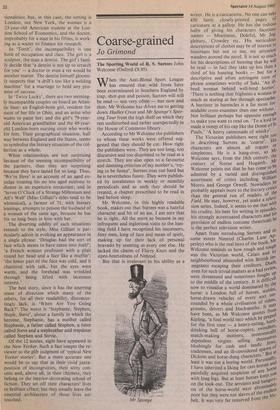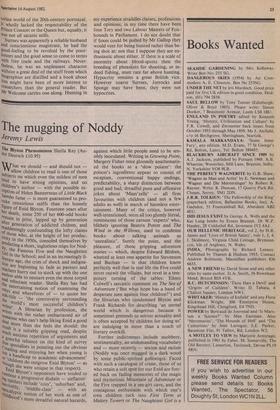Coarse-grained
Jo Grimond
The Sporting World of R. S. Surtees John Welcome (Oxford £9.95) when the Anti-Blood Sport League has ensured that wild foxes have been exterminated in Southern England by trap, shot-gun and poison, Surtees will still be read — not very often — but now and then. Mr Welcome has driven me to getting down Hadley Cross and Mr Sponge's Spor- ting Tour from the high shelf on which they rest undisturbed and rather unexpectedly in the House of Commons library.
According to Mr Welcome the publishers to whom these works were offered sug- gested that they should be cut. How right the publishers were. They are too long, too discursive and too disjointed to be read at a stretch. They are also open to a favourite and damning criticism of my mother's, 'try- ing to be funny'. Surtees tries too hard but he is nevertheless funny. They were publish- ed by instalments in weekly or monthly periodicals and as such they should be treated, a chapter prescribed to be read in bed before sleep.
Mr Welcome, in this highly readable book, makes out that Surtees was a hateful character and bit of an ass. I am sure that he is right. All the more so because in my infrequent and inglorious visits to the hun- ting field I have recognised his successors, foxy men, long of face and mean of spirit, making up for their lack of personal bravado by sneering at every one else. He lacked the charm of Flurry Knox and the open-heartedness of Nimrod.
But that is irrelevant to his ability as a
Mr Sponge Spectator 14 August 1982 writer. He is a caricaturist. No one can take 450 fairly closely-printed pages of caricature at a gallop. He has the tedious habit of giving his characters facetious names — Miserimus, Doleful, Mr Jog- glebury, Crowdey etc. His meticulous descriptions of clothes may be of interest to historians but not to me; my attention wanders around the navel. It is not so much for his descriptions of hunting that he will be read — in fact they take up less than a third of his hunting books — but for a descriptive and often astringent turn of phrase sometimes worthy of Saki. 'An bred woman behind well-bred horses'. 'There is nothing that frightens a woman so
much as staring at her through spectacles. A barrister in barnacles is a far more for- midable cross-examiner than one without.' Not brilliant perhaps but apposite enough to make you want to read on. 'To a lord he made a sweep of his cap like the Dome of St Pauls."A heavy cannonade of whisky'•
The Victorian publishers were right too in describing Surtees as 'coarse'. His characters are almost all rogues or simpletons. He is a hang-over, as Mt Welcome says, from the 18th century, the century of Sterne and Hogarth. Mr Welcome points out that he has come to be admired by a varied and distinguished assortment of critics including William Morris and Geor,ge Orwell. Nowadays he probably appeals more to the literary critics than the general run of readers of the Field. He may, however, yet make a televi- sion series. Indeed, it seems to me that with his crudity, his bent for writing in episodes, his strongly accentuated characters and his provision of endless costume theatricals he is the perfect television writer.
Apart from introducing Surtees and to
some extent Nimrod (Charles Lane AP- perley) who is the real hero of the book, MI: Welcome reminds us how rough and tough was the Victorian world. Calais and Its neighbourhood abounded with British on" migrants escaping their creditors. Duels' even for such trivial matters as a bad review, were threatened and sometimes fought up to the middle of the century. It is difficult now to visualise a world dominated by the horse: a London full of horses, stables, horse-drawn vehicles of every sort. Or rounded by a whole civilisation of riders, grooms, drivers and blacksmiths. It may have been, as Mr Welcome quotes from Kipling, 'a foul world into which he Peeped
.
for the first time — a heavy-eating, halt! drinking hell of horse-copers, match-making mothers, economloalis dependent virgins selling themselves blushingly for cash and lands: Jewd tradesmen, and an ill-considered spawn at Dickens and horse-dung characters. But least it was not a boring world. PersonalinY±, I have inherited a liking for cart-horses and painfully acquired suspicion of any horse with long legs. But at least horses keeP You on the look-out. The servants and haPgealoss
,,,
nd on of the horse-world were abomineu poor but they were not slaves of the endless poor It was very far removed from the Vic-
torian world of the 20th-century portrayal. It wholly lacked the respectability of the Prince Consort or the Queen but, equally, it was not all satanic mills.
Surtees was apparently a reliable husband and conscientious magistrate, he had the good-feeling to be revolted by the poor- houses and the good sense to come to terms With free trade and the railways. Never- theless, he was an unpleasant character Without a great deal of the stuff from which biographies are distilled and a book about him might have been of more interest to researchers than the general reader. But Mr Welcome carries one along. Hunting in
my experience straddles classes, professions and opinions; in my time there have been four Tory and two Labour Masters of Fox- hounds in Parliament. I do not doubt that if foxes could be polled by Mr Gallup they would vote for being hunted rather than be- ing shot at: not that I suppose they are en- thusiastic about either. If there is a scale of enormity about blood-sports then the breeding of pheasants for shooting, or in- deed fishing, must rate far above hunting. Hypocrisy remains a great British vice. However coarse Surtees, Jorrocks and Sponge may have been, they were not hypocrites.



































 Previous page
Previous page